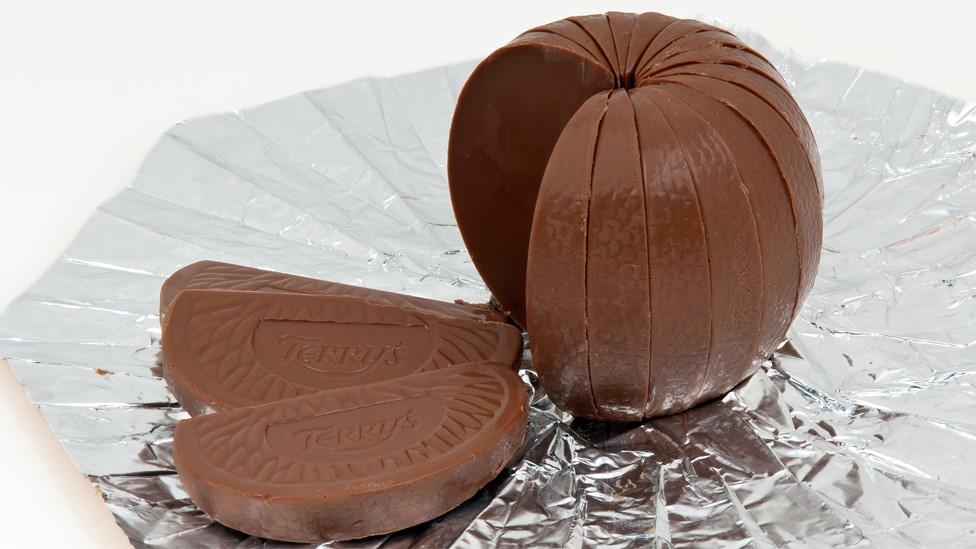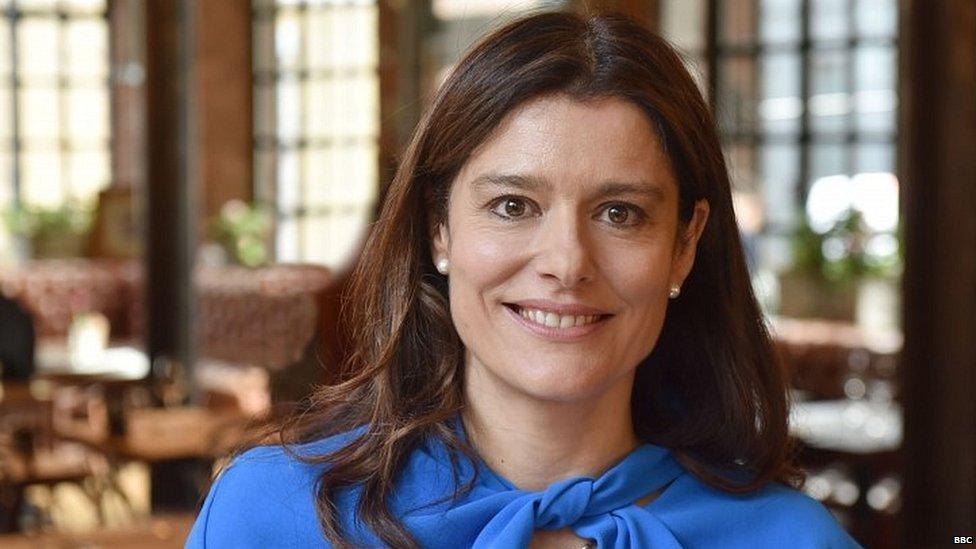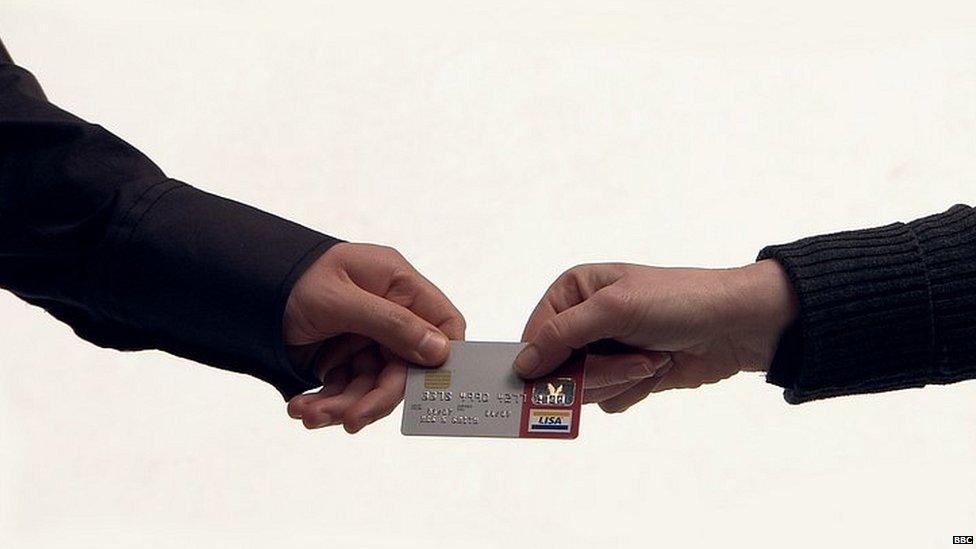Brexit means what? Time for the metaphors to stop
- Published

Like the thin twig of peace, the Brexit metaphor has been stretched to melting point. It should be taken round the back of the paragraph and quietly put out of its misery.
Since Britain voted to leave the European Union, politicians and commentators have deployed everything from cakes, cherries, cats, even golf clubs to try to explain what it might all mean.
Yet, in recent weeks, it has become clear that many of these analogies have become absurd and redundant.
The head of the UK's public spending watchdog, Sir Amyas Morse, compares Brexit to "a chocolate orange" that might fall apart at the first tap. The Tory MP Charlie Elphicke fears a "Hotel California" Brexit where "you can check out any time you like, but you can never leave".
The businessman Lord Wolfson likens Brexit to a frantic bus journey where the passengers are fighting over its speed and direction.
And Miriam Gonzalez Durantez, the international lawyer and wife of the former Lib Dem leader Nick Clegg, compares Brexit on her food blog to a strawberry pudding: "The crumble, just like Brexit, seems fine on the outside, though if you look attentively you can see that there is a mess bubbling up inside. And it will definitely fall apart when you serve it, no matter how hard you try."
Enough, please. Enough.
In the beginning, there was some sense in using metaphor to explain a complex issue. Brexit was "soft" if it involved continued membership of the single market or customs union, "hard" if it meant the opposite.
Theresa May then muddied the waters by uttering these words: "I'm interested in all these terms that have been identified - hard Brexit, soft Brexit, black Brexit, white Brexit, grey Brexit - and actually what we should be looking for is a red, white and blue Brexit."
Brexit was compared to marital separation because it allowed people to distinguish between Britain's immediate exit from the EU - the "divorce" - and its longer-term trading relations.
But the comparison was stretched to unsustainable lengths, with discussion about who gets to divide the music collection and keep the children and so on.

To Miriam Gonzalez Durantez, Brexit resembles a fruit crumble
There was also the small problem that in this divorce one side was made up of 27 different nations. Is "Mutti" Merkel the mother in this metaphor and the other 26 countries her children? Up to a point, Dr Freud.
The prime minister told MPs in March she did not like the "divorce" metaphor. "I prefer not to use that term with regard to the European Union because often, when people get divorced, they do not have a good relationship afterwards."
So her dutiful Foreign Secretary, Boris Johnson, steered away from marital matters and chose a metaphor closer to his stomach than his heart. He declared that when it came to Brexit, he wanted Britain to "have its cake and eat it".
The EU countered with its own gastronomic analogy, saying that "cherry picking" the best bits of the EU would not be tolerated.
Again these clichés made some sort of sense at first but later became rather silly. I went to a seminar recently where someone declared - without irony - that Britain did not want to have its cake and eat it, it just did not agree with the EU what the recipe for the cake should be.
The debate about how much money the UK should pay when it exits the EU has prompted many figurative contortions. Some in Britain argued that when one leaves a golf club, one should stop paying the direct debit and certainly not fork out for another round of green fees.
But the European Commission president, Jean-Claude Juncker, insisted over dinner with Theresa May in April that the EU was "not a golf club that could be easily joined or left"; it was a family, and Brexit should be treated as divorce.
The European Parliament's Brexit negotiator, Guy Verhofstadt, was more prosaic, comparing Britain's outstanding payments to a round of drinks, telling the Financial Times that "it would be wrong for EU taxpayers to be asked to pay Britain's bar bill".

Is Brexit a full-blown divorce or a mere settling of domestic accounts?
On the other side of Brussels, the EU's chief negotiator, Michel Barnier, disagreed, declaring: "There is no Brexit bill. The financial settlement is only about settling the accounts."
The problem is that this only adds to the confusion. To a French speaker, "settling the accounts" means no more than Britain paying its debts. To an English speaker, it can just as easily mean the EU seeking its revenge.
Take the Daily Telegraph's Allister Heath, for example, who wrote that by demanding billions of euros from the UK, the EU was trying to impose war reparations. "The last time this sort of idiocy was attempted was in 1919, at the Treaty of Versailles, when a defeated Germany was ordered to accept full responsibility for the war and to pay vast reparations to the allied powers."
May: I’m ambitious for what we can achieve
The problem with these metaphors is that they confuse the point of the financial dispute, namely how much Britain should pay for EU spending in the future, and not just for its current and past obligations. Unless, of course, confusion is the point, a little creative ambiguity to nudge the negotiations along.
And still the metaphor-fest has rolled on.
Mr Verhofstadt - him again - has described Brexit as a "catfight in the Conservative Party that got out of hand". Emmanuel Macron, the newly elected French president, has said the UK is finding out that Brexit was "no walk in the park".
The respected commentator, Philip Collins, wrote recently in The Times, that "leaving the European Union is a Schrödinger's cat kind of problem". Such is his confidence in the intelligence and knowledge of Times' readers that Mr Collins chose not to offer a word of explanation.
Those of us unfamiliar with this particular feline had to reach for Google to discover it refers to a thought problem asking if it is possible to hold two contradictory truths at the same time.

The EU chief negotiator's reference to hilly climbs strike may have struck a chord with the prime minister
At a recent news conference, Michel Barnier went on a flight of metaphorical Brexit fancy when he revealed that he, like Theresa May, also enjoyed hill walking.
"If you like walking in the mountains you have to learn a number of rules. You have to learn to put one foot in front of the other because sometimes you are on a steep and rocky path. You also have to look [at] what accidents might befall you - falling rocks."
He added: "You have to be very careful to keep your breath. You have to have stamina because it could be a lengthy path and you have to keep looking at the summit."
This is very practical or very deep. Either way, it is very French.
And it is certainly too much. Can we just agree that Brexit means Brexit and leave it at that?